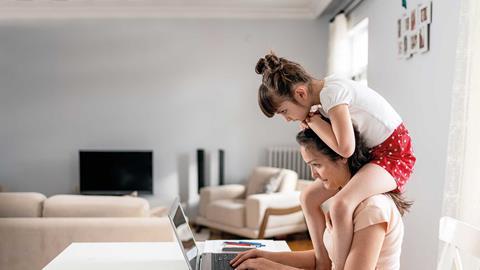
Working from home (WFH) could not be more straightforward, or so the legal press has repeatedly assured us. After all, you just need a laptop, an internet connection, a telephone and somewhere quiet(ish) to ply your trade. This could be the new normal, we also hear, a brave new world freed from the fetters of commuting and office politics. The dreams of a good work-life balance made real.
Except, according to LawCare, a charity that promotes mental wellbeing across the legal community, this alluring vision of the sunlit uplands of successful WFH misses a crucial ingredient: human interaction.
Not everyone takes easily to WFH. Consider junior lawyers. Senior colleagues may only be an email or phone call away, but many junior lawyers still feel cast adrift, lacking the day-to-day supervision that fuels their professional development. Stress, too, affects everyone differently. Some lawyers may cope effortlessly with the conflicting responsibilities of managing a full caseload and providing home schooling, for example. Others may crumble under the pressure. Relationships deteriorate. Alcohol consumption rockets. Those sunlit uplands become distant, dark, dangerous places.
LawCare’s Mary Jackson and Trish McLellan’s recent Zoom presentation ‘Keep on keeping on’ reminded us that the law, even at the best of times, is one of the most stressful professions. But stress is a big issue across the entire working population. The UK’s Health and Safety Executive, for instance, found that 17.9m working days were lost in 2019/20 because of work-related stress, depression and anxiety.
Jackson and McLellan proposed no easy solutions to the challenges of WFH. On the contrary, they highlighted the problems caused by poor supervision and procedures, as well as inadequate IT equipment, feelings of isolation and excessive caseloads.
It is not a silver bullet, they told us, but treating yourself better will lighten the burden. Start with not being overly self-critical: remember clients are also going through lockdown and will understand interruptions and background noise from children or dogs. Try to stick to a routine, give yourself a break from the desk (or kitchen table) from time to time, and exercise regularly. Even a stroll around the garden – if you are lucky enough to have one – will make your brain function better.
Other practical tips included letting light into the room where you work: sunshine cheers us all up. Too much noise from children or flatmates? Try wearing earplugs. Are there still dirty plates from last night’s supper on the dining table cum desk? Declutter. You would not share space on your office desk with congealed gravy. And do not lose touch with colleagues and mentors. It may only be an email, phone or Zoom call, but it is comforting to know you are not alone and that someone out there has your back.
Jackson and McLellan introduced us to several practical tips, one of which is called the Pomodoro (the Italian word for tomato) Technique. This is a time-management method that asks you to alternate pomodoros – focused work sessions – with short breaks to promote concentration and reduce mental fatigue. Essentially, you break your workday into 25-minute chunks – pomodoros – separated by five-minute breaks. After four such chunks, you take a longer break of around half an hour. The objective is to keep refreshing so that you are always working at maximum efficiency. Why is the technique named after a tomato? Because its inventor used a tomato-shaped kitchen timer to record how long he worked and how long he rested.
They also gave us practical tips on how to relax better when life is about to overwhelm us. The crisis could arise from one particular problem or a combination of problems associated with WFH, such as home schooling, relationship tensions, substance abuse, inadequate IT equipment, lack of supervision, a sense of isolation or the feeling – to coin a phrase – that you can no longer keep on keeping on.
Jackson and McLellan proposed some simple antidotes to stress that are often overlooked. One is to rub your hands together and then place them over your eyes. (Why this should make a difference is anyone’s guess, but it does.) Another is to get up from your desk and stretch or, while you are at it, walk away, if only for a minute, from your laptop. Yet another is to breathe deeply, fill your lungs with air and breathe out. Repeat this a couple of times. This will give you more oxygen, which is good, and less of the stress hormone cortisol, too much of which can be bad. More sleep and exercise, along with a healthier diet, all help, too, of course.
Should all this be too much to take in after just the one presentation, Jackson and McLellan pointed us towards Fit For Law. This free online resource for all legal professionals was developed by LawCare in partnership with the University of Sheffield and the Open University. Its aim is ‘to promote psychologically and emotionally healthier ways of working within law’. Broken up into bite-sized chunks, it deals with understanding emotions and stress, and includes practical strategies, activities and videos (see fitforlaw.org.uk).
The law is a tough profession, but a dose of self-care along with better managing your day should keep you keeping on until lockdown and vaccinations open the door to holidays in the sun again.
Jonathan Rayner is Gazette contributing writer
Webinar series
Setting Yourself Up For Sustainable Success in the Legal Profession
Listen to Claire Williamson, director at Leading Minds, in our new series of three live webinars, designed to develop the intrapersonal skills and daily habits necessary to perform well under pressure and achieve your career goals.
26 Feb – 12 March, £75 +VAT.
Find out more here.
































No comments yet